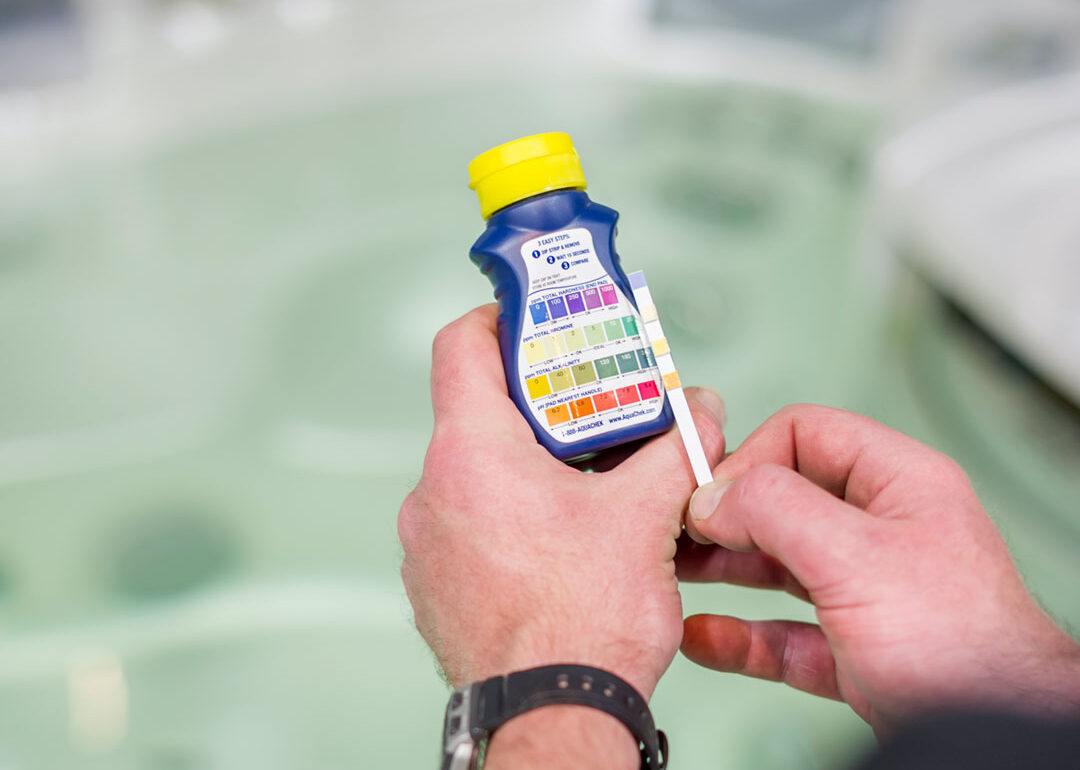Are you ready for a nice relaxing soak in the hot tub? Are you sure? If you didn’t think about the quality of the water before answering that question, you might want to think again. Before your temporary escape to paradise, make sure that the water is properly balanced to protect both you and your equipment.
Hot tubs operate at a higher temperature and are much smaller bodies of water compared to a 15,000-gallon swimming pool, for example. These two facts change everything.
Because of the high temps (generally between 95ºF and 105ºF) and small body of water, the water condition can change very quickly. Therefore, you have to test your hot tub frequently to ensure that the water is safe, clear and odor free. Those higher temperatures means a larger dose of organic waste (think perspiration) from you, your family and your friends. You also have to be careful to keep your chemicals in the right range to avoid scale buildup in the warmer temperatures of hot tub water. Depending on a number of factors, all of the sanitizer (chlorine or bromine) in spa water can be used up, too.
Testing the Water
The table below lists the recommended national standards for public hot tub testing as established by the Pool and Hot Tub Alliance. Maintaining such levels will protect you from Recreational Water Illnesses (RWIs), keep you comfortable during your hot tub session and protect your expensive hot tub equipment.
If you are familiar with swimming pool chemistry, you will notice that the recommended sanitizer level (chlorine or bromine) is higher in hot tubs. This is due to the smaller hot tub size and higher temperatures as well.
Testing Frequency
Hot tubs require more frequent testing than pools, for all the reasons we have discussed above. You should test the sanitizer level before each use of the hot tub. As soon as people get into the hot tub, they begin to deplete the sanitizer level — and it can deplete quickly. Keep this in mind: a small hot tub with a couple of people using it is comparable to a jam-packed public pool on a hot summer day! Start by making sure that your sanitizer, chlorine or bromine, is in the ideal range. Test total alkalinity and pH levels at least twice a week as well.
TDS (total dissolved solids) is one other parameter that you should check on a routine basis. TDS is the buildup of everything that you add to the water (chemicals, organic waste, fresh water, etc. all contain dissolved solids). TDS can build up quickly in a hot tub primarily because you are adding fairly large doses of chemicals to a small volume of water. Measuring the TDS level can give you an indication of when it is time to drain and refill your hot tub.
When to Drain and Refill
This is the good news about caring for a hot tub. All of the potential problems that we have covered in this section can be fixed relatively easily. The chemical dosages are small, you can treat the water quickly and your filter can remove the large particles in a brief amount of time.
If the water quality becomes poor, or when the TDS level is 1,500 ppm greater than it was when you first used your hot tub, just drain, use a purge product to clean out your pipes and refill it. Because the water volume involved is so small, it does not usually require a major effort or expense to drain and refill with fresh water. Even if you monitor the water’s chemical balance perfectly, the water gets old and the TDS builds up, leading to problems like cloudy water, foamy water or pH fluctuation.
Maintaining your hot tub water within the recommended levels will help you enjoy your hot tub every time, making it more relaxing. This will also limit the potential for skin and eye irritation that can be caused by improperly treated or unbalanced water. Testing your hot tub regularly will keep you enjoying the hot water, instead of being ‘in hot water’ because of a problem.



